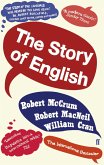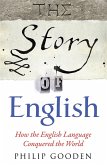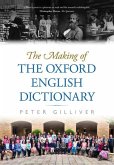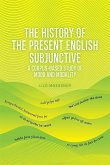Laurel J. Brinton (Professor, Department of English, Professor, Dep, Leslie K. Arnovick (Professor, Department of English, Professor, De
The English Language
A Linguistic History
Laurel J. Brinton (Professor, Department of English, Professor, Dep, Leslie K. Arnovick (Professor, Department of English, Professor, De
The English Language
A Linguistic History
- Broschiertes Buch
- Merkliste
- Auf die Merkliste
- Bewerten Bewerten
- Teilen
- Produkt teilen
- Produkterinnerung
- Produkterinnerung
The English Language: A Linguistic History surveys the development of the English language from its Indo-European past to the present day.
Andere Kunden interessierten sich auch für
![The English Language The English Language]() Simon Horobin (Professor of English Language and Univer LiteratureThe English Language12,99 €
Simon Horobin (Professor of English Language and Univer LiteratureThe English Language12,99 €![The Story of English The Story of English]() Robert McCrumThe Story of English18,99 €
Robert McCrumThe Story of English18,99 €![The Story of English The Story of English]() Philip GoodenThe Story of English16,99 €
Philip GoodenThe Story of English16,99 €![The Making of the Oxford English Dictionary The Making of the Oxford English Dictionary]() Peter Gilliver (Associate Editor, Associate Editor, IOxford EnglisThe Making of the Oxford English Dictionary41,99 €
Peter Gilliver (Associate Editor, Associate Editor, IOxford EnglisThe Making of the Oxford English Dictionary41,99 €![The Greatest Invention The Greatest Invention]() Silvia FerraraThe Greatest Invention22,99 €
Silvia FerraraThe Greatest Invention22,99 €![The History of the Present English Subjunctive The History of the Present English Subjunctive]() Lilo MoessnerThe History of the Present English Subjunctive152,99 €
Lilo MoessnerThe History of the Present English Subjunctive152,99 €![The Greatest Invention The Greatest Invention]() Silvia FerraraThe Greatest Invention30,99 €
Silvia FerraraThe Greatest Invention30,99 €-
-
-
The English Language: A Linguistic History surveys the development of the English language from its Indo-European past to the present day.
Hinweis: Dieser Artikel kann nur an eine deutsche Lieferadresse ausgeliefert werden.
Hinweis: Dieser Artikel kann nur an eine deutsche Lieferadresse ausgeliefert werden.
Produktdetails
- Produktdetails
- Verlag: Oxford University Press, Canada
- 3 Revised edition
- Seitenzahl: 640
- Erscheinungstermin: 1. März 2017
- Englisch
- Abmessung: 228mm x 177mm x 25mm
- Gewicht: 906g
- ISBN-13: 9780199019151
- ISBN-10: 0199019150
- Artikelnr.: 47864940
- Herstellerkennzeichnung
- Libri GmbH
- Europaallee 1
- 36244 Bad Hersfeld
- 06621 890
- Verlag: Oxford University Press, Canada
- 3 Revised edition
- Seitenzahl: 640
- Erscheinungstermin: 1. März 2017
- Englisch
- Abmessung: 228mm x 177mm x 25mm
- Gewicht: 906g
- ISBN-13: 9780199019151
- ISBN-10: 0199019150
- Artikelnr.: 47864940
- Herstellerkennzeichnung
- Libri GmbH
- Europaallee 1
- 36244 Bad Hersfeld
- 06621 890
Laurel J. Brinton, Professor, Department of English, University of British Columbia, Leslie K. Arnovick, Professor, Department of English, University of British Columbia
* List of Tables, Figures, and Sample Texts
* Preface
* Abbreviations
* 1: Studying the History of English
* Overview
* Objectives
* Why Study the History of English?
* A Definition of Language
* The Components of Language
* Linguistic Change in English
* The Nature of Linguistic Change
* The Origin of Language
* Attitudes toward Linguistic Change
* Resources for Studying the History of English
* Recommended Resources
* 2: Sounds and Sound Change in English
* Overview
* Objectives
* The Sounds of English
* Sound Change
* The Writing of English
* Recommended Resources
* 3: Causes and Mechanisms of Language Change
* Overview
* Objectives
* Causes of Change
* Morphological and Syntactic Change
* Semantic Change
* Pragmatic Change
* Recommended Resources
* 4: The Indo-European Language Family and Proto-Indo-European
* Overview
* Objectives
* Classification of Languages
* Language Families
* The Indo-European Language Family
* Proto-Language
* Reconstruction
* Proto-Indo-European
* Recommended Resources
* 5: Germanic and the Development of Old English
* Overview
* Objectives
* Proto-Germanic
* Grammatical and Lexical Changes from PIE to Germanic
* Phonological Changes from PIE to Germanic
* A Brief History of Anglo-Saxon England
* The Records of the Anglo-Saxons
* Recommended Resources
* 6: The Words and Sounds of Old English
* Overview
* Objectives
* The Word Stock of the Anglo-Saxons
* The Orthographic System of Old English
* The Phonological System of Old English
* Stress
* A Closer Look at the Language of an Old English Text
* Recommended Resources
* 7: The Grammar of Old English
* Overview
* Objectives
* The Nominal System
* The Verbal System
* Syntax
* A Closer Look at the Language of an Old English Text
* Recommended Resources
* 8: The Rise of Middle English: Words and Sounds
* Overview
* Objectives
* French and English in Medieval England
* The Word Stock of Middle English
* The Written Records of Middle English
* Orthographic Changes
* Consonant Changes
* Vowel Changes
* A Closer Look at the Language of a Middle English Text
* Recommended Resources
* 9: The Grammar of Middle English and Rise of a Written Standard
* Overview
* Objectives
* The Effects of Vowel Reduction
* Comparison of a Middle English and an Old English Text
* Change from Synthetic to Analytic
* Middle English as a Creole?
* The Rise of a Standard Dialect
* A Closer Look at the Language of a Middle English Text
* Recommended Resources
* 10: The Words, Sounds, and Inflections of Early Modern English
* Overview
* Objectives
* Early Modern English Vocabulary
* The Great Vowel Shift
* Changes in the Short Vowels and Diphthongs
* A Closer Look at the Language of an Early Modern English Text
* Changes in Consonants
* Renaissance Respellings
* Changes in Nominal Inflected Forms
* Case Usage
* Changes in Verbal Inflected Forms
* A Closer Look at the Language of an Early Modern English Text
* Recommended Resources
* 11: Early Modern English Verbal Constructions and Eighteenth-Century
Prescriptivism
* Overview
* Objectives
* Early Modern English Syntax
* Late Modern English and the Rise of Prescriptivism
* Aims of the Eighteenth-Century Grammarians
* Methods of the Eighteenth-Century Grammarians
* The Question of Usage
* Dictionaries
* Recommended Resources
* 12: Modern English
* Overview
* Objectives
* Grammatical and Lexical Changes in Late Modern English
* Changes in Progress
* The Effect of New Media on English
* Recommended Resources
* 13: Varieties of English
* Overview
* Objectives
* The Development of National Varieties
* Important Regional Varieties of the British Isles
* English as a Global Language
* Recommended Resources
* Appendix A: Quick Reference Guide
* Appendix B: Timeline of Significant Historical, Social, Literary, and
Linguistic Events in the History of English
* Appendix C: Anthology of Readings
* Exercise Key
* Glossary of Linguistic Terms
* Works Cited
* Index
* Preface
* Abbreviations
* 1: Studying the History of English
* Overview
* Objectives
* Why Study the History of English?
* A Definition of Language
* The Components of Language
* Linguistic Change in English
* The Nature of Linguistic Change
* The Origin of Language
* Attitudes toward Linguistic Change
* Resources for Studying the History of English
* Recommended Resources
* 2: Sounds and Sound Change in English
* Overview
* Objectives
* The Sounds of English
* Sound Change
* The Writing of English
* Recommended Resources
* 3: Causes and Mechanisms of Language Change
* Overview
* Objectives
* Causes of Change
* Morphological and Syntactic Change
* Semantic Change
* Pragmatic Change
* Recommended Resources
* 4: The Indo-European Language Family and Proto-Indo-European
* Overview
* Objectives
* Classification of Languages
* Language Families
* The Indo-European Language Family
* Proto-Language
* Reconstruction
* Proto-Indo-European
* Recommended Resources
* 5: Germanic and the Development of Old English
* Overview
* Objectives
* Proto-Germanic
* Grammatical and Lexical Changes from PIE to Germanic
* Phonological Changes from PIE to Germanic
* A Brief History of Anglo-Saxon England
* The Records of the Anglo-Saxons
* Recommended Resources
* 6: The Words and Sounds of Old English
* Overview
* Objectives
* The Word Stock of the Anglo-Saxons
* The Orthographic System of Old English
* The Phonological System of Old English
* Stress
* A Closer Look at the Language of an Old English Text
* Recommended Resources
* 7: The Grammar of Old English
* Overview
* Objectives
* The Nominal System
* The Verbal System
* Syntax
* A Closer Look at the Language of an Old English Text
* Recommended Resources
* 8: The Rise of Middle English: Words and Sounds
* Overview
* Objectives
* French and English in Medieval England
* The Word Stock of Middle English
* The Written Records of Middle English
* Orthographic Changes
* Consonant Changes
* Vowel Changes
* A Closer Look at the Language of a Middle English Text
* Recommended Resources
* 9: The Grammar of Middle English and Rise of a Written Standard
* Overview
* Objectives
* The Effects of Vowel Reduction
* Comparison of a Middle English and an Old English Text
* Change from Synthetic to Analytic
* Middle English as a Creole?
* The Rise of a Standard Dialect
* A Closer Look at the Language of a Middle English Text
* Recommended Resources
* 10: The Words, Sounds, and Inflections of Early Modern English
* Overview
* Objectives
* Early Modern English Vocabulary
* The Great Vowel Shift
* Changes in the Short Vowels and Diphthongs
* A Closer Look at the Language of an Early Modern English Text
* Changes in Consonants
* Renaissance Respellings
* Changes in Nominal Inflected Forms
* Case Usage
* Changes in Verbal Inflected Forms
* A Closer Look at the Language of an Early Modern English Text
* Recommended Resources
* 11: Early Modern English Verbal Constructions and Eighteenth-Century
Prescriptivism
* Overview
* Objectives
* Early Modern English Syntax
* Late Modern English and the Rise of Prescriptivism
* Aims of the Eighteenth-Century Grammarians
* Methods of the Eighteenth-Century Grammarians
* The Question of Usage
* Dictionaries
* Recommended Resources
* 12: Modern English
* Overview
* Objectives
* Grammatical and Lexical Changes in Late Modern English
* Changes in Progress
* The Effect of New Media on English
* Recommended Resources
* 13: Varieties of English
* Overview
* Objectives
* The Development of National Varieties
* Important Regional Varieties of the British Isles
* English as a Global Language
* Recommended Resources
* Appendix A: Quick Reference Guide
* Appendix B: Timeline of Significant Historical, Social, Literary, and
Linguistic Events in the History of English
* Appendix C: Anthology of Readings
* Exercise Key
* Glossary of Linguistic Terms
* Works Cited
* Index
* List of Tables, Figures, and Sample Texts
* Preface
* Abbreviations
* 1: Studying the History of English
* Overview
* Objectives
* Why Study the History of English?
* A Definition of Language
* The Components of Language
* Linguistic Change in English
* The Nature of Linguistic Change
* The Origin of Language
* Attitudes toward Linguistic Change
* Resources for Studying the History of English
* Recommended Resources
* 2: Sounds and Sound Change in English
* Overview
* Objectives
* The Sounds of English
* Sound Change
* The Writing of English
* Recommended Resources
* 3: Causes and Mechanisms of Language Change
* Overview
* Objectives
* Causes of Change
* Morphological and Syntactic Change
* Semantic Change
* Pragmatic Change
* Recommended Resources
* 4: The Indo-European Language Family and Proto-Indo-European
* Overview
* Objectives
* Classification of Languages
* Language Families
* The Indo-European Language Family
* Proto-Language
* Reconstruction
* Proto-Indo-European
* Recommended Resources
* 5: Germanic and the Development of Old English
* Overview
* Objectives
* Proto-Germanic
* Grammatical and Lexical Changes from PIE to Germanic
* Phonological Changes from PIE to Germanic
* A Brief History of Anglo-Saxon England
* The Records of the Anglo-Saxons
* Recommended Resources
* 6: The Words and Sounds of Old English
* Overview
* Objectives
* The Word Stock of the Anglo-Saxons
* The Orthographic System of Old English
* The Phonological System of Old English
* Stress
* A Closer Look at the Language of an Old English Text
* Recommended Resources
* 7: The Grammar of Old English
* Overview
* Objectives
* The Nominal System
* The Verbal System
* Syntax
* A Closer Look at the Language of an Old English Text
* Recommended Resources
* 8: The Rise of Middle English: Words and Sounds
* Overview
* Objectives
* French and English in Medieval England
* The Word Stock of Middle English
* The Written Records of Middle English
* Orthographic Changes
* Consonant Changes
* Vowel Changes
* A Closer Look at the Language of a Middle English Text
* Recommended Resources
* 9: The Grammar of Middle English and Rise of a Written Standard
* Overview
* Objectives
* The Effects of Vowel Reduction
* Comparison of a Middle English and an Old English Text
* Change from Synthetic to Analytic
* Middle English as a Creole?
* The Rise of a Standard Dialect
* A Closer Look at the Language of a Middle English Text
* Recommended Resources
* 10: The Words, Sounds, and Inflections of Early Modern English
* Overview
* Objectives
* Early Modern English Vocabulary
* The Great Vowel Shift
* Changes in the Short Vowels and Diphthongs
* A Closer Look at the Language of an Early Modern English Text
* Changes in Consonants
* Renaissance Respellings
* Changes in Nominal Inflected Forms
* Case Usage
* Changes in Verbal Inflected Forms
* A Closer Look at the Language of an Early Modern English Text
* Recommended Resources
* 11: Early Modern English Verbal Constructions and Eighteenth-Century
Prescriptivism
* Overview
* Objectives
* Early Modern English Syntax
* Late Modern English and the Rise of Prescriptivism
* Aims of the Eighteenth-Century Grammarians
* Methods of the Eighteenth-Century Grammarians
* The Question of Usage
* Dictionaries
* Recommended Resources
* 12: Modern English
* Overview
* Objectives
* Grammatical and Lexical Changes in Late Modern English
* Changes in Progress
* The Effect of New Media on English
* Recommended Resources
* 13: Varieties of English
* Overview
* Objectives
* The Development of National Varieties
* Important Regional Varieties of the British Isles
* English as a Global Language
* Recommended Resources
* Appendix A: Quick Reference Guide
* Appendix B: Timeline of Significant Historical, Social, Literary, and
Linguistic Events in the History of English
* Appendix C: Anthology of Readings
* Exercise Key
* Glossary of Linguistic Terms
* Works Cited
* Index
* Preface
* Abbreviations
* 1: Studying the History of English
* Overview
* Objectives
* Why Study the History of English?
* A Definition of Language
* The Components of Language
* Linguistic Change in English
* The Nature of Linguistic Change
* The Origin of Language
* Attitudes toward Linguistic Change
* Resources for Studying the History of English
* Recommended Resources
* 2: Sounds and Sound Change in English
* Overview
* Objectives
* The Sounds of English
* Sound Change
* The Writing of English
* Recommended Resources
* 3: Causes and Mechanisms of Language Change
* Overview
* Objectives
* Causes of Change
* Morphological and Syntactic Change
* Semantic Change
* Pragmatic Change
* Recommended Resources
* 4: The Indo-European Language Family and Proto-Indo-European
* Overview
* Objectives
* Classification of Languages
* Language Families
* The Indo-European Language Family
* Proto-Language
* Reconstruction
* Proto-Indo-European
* Recommended Resources
* 5: Germanic and the Development of Old English
* Overview
* Objectives
* Proto-Germanic
* Grammatical and Lexical Changes from PIE to Germanic
* Phonological Changes from PIE to Germanic
* A Brief History of Anglo-Saxon England
* The Records of the Anglo-Saxons
* Recommended Resources
* 6: The Words and Sounds of Old English
* Overview
* Objectives
* The Word Stock of the Anglo-Saxons
* The Orthographic System of Old English
* The Phonological System of Old English
* Stress
* A Closer Look at the Language of an Old English Text
* Recommended Resources
* 7: The Grammar of Old English
* Overview
* Objectives
* The Nominal System
* The Verbal System
* Syntax
* A Closer Look at the Language of an Old English Text
* Recommended Resources
* 8: The Rise of Middle English: Words and Sounds
* Overview
* Objectives
* French and English in Medieval England
* The Word Stock of Middle English
* The Written Records of Middle English
* Orthographic Changes
* Consonant Changes
* Vowel Changes
* A Closer Look at the Language of a Middle English Text
* Recommended Resources
* 9: The Grammar of Middle English and Rise of a Written Standard
* Overview
* Objectives
* The Effects of Vowel Reduction
* Comparison of a Middle English and an Old English Text
* Change from Synthetic to Analytic
* Middle English as a Creole?
* The Rise of a Standard Dialect
* A Closer Look at the Language of a Middle English Text
* Recommended Resources
* 10: The Words, Sounds, and Inflections of Early Modern English
* Overview
* Objectives
* Early Modern English Vocabulary
* The Great Vowel Shift
* Changes in the Short Vowels and Diphthongs
* A Closer Look at the Language of an Early Modern English Text
* Changes in Consonants
* Renaissance Respellings
* Changes in Nominal Inflected Forms
* Case Usage
* Changes in Verbal Inflected Forms
* A Closer Look at the Language of an Early Modern English Text
* Recommended Resources
* 11: Early Modern English Verbal Constructions and Eighteenth-Century
Prescriptivism
* Overview
* Objectives
* Early Modern English Syntax
* Late Modern English and the Rise of Prescriptivism
* Aims of the Eighteenth-Century Grammarians
* Methods of the Eighteenth-Century Grammarians
* The Question of Usage
* Dictionaries
* Recommended Resources
* 12: Modern English
* Overview
* Objectives
* Grammatical and Lexical Changes in Late Modern English
* Changes in Progress
* The Effect of New Media on English
* Recommended Resources
* 13: Varieties of English
* Overview
* Objectives
* The Development of National Varieties
* Important Regional Varieties of the British Isles
* English as a Global Language
* Recommended Resources
* Appendix A: Quick Reference Guide
* Appendix B: Timeline of Significant Historical, Social, Literary, and
Linguistic Events in the History of English
* Appendix C: Anthology of Readings
* Exercise Key
* Glossary of Linguistic Terms
* Works Cited
* Index








